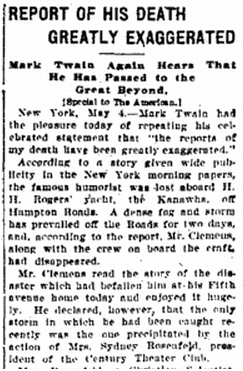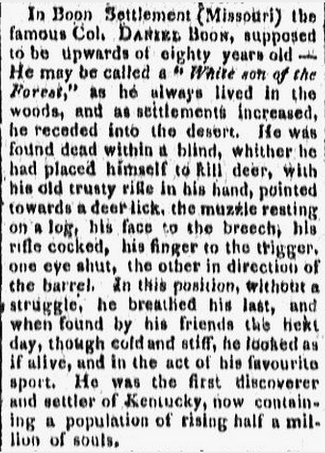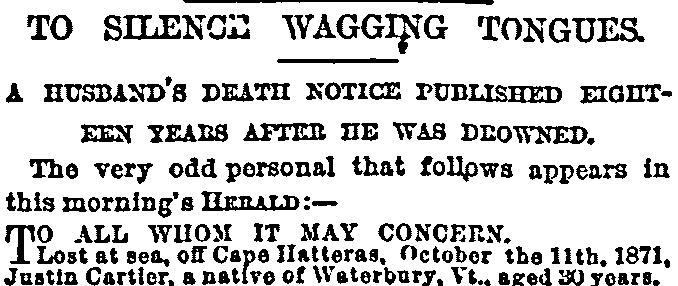Introduction: Mary Harrell-Sesniak is a genealogist, author and editor with a strong technology background. In this guest blog post, Mary searches old newspapers to find odd and humorous obituaries—some of which will give you a chuckle.
Reading obits is part of the everyday life of family historians—but some are almost stranger than fiction! Here are some unusual obituaries found in the online collection of GenealogyBank’s Historical Newspaper Archives.
Untimely Death Notices
Some people die young—but more than one person has had their death reported numerous times while they were still alive!
The most famous of these was the humorist Samuel Clemens death (1835-1910), better known by his pen name “Mark Twain.” Newspapers repirted Mark Twain’s death date seven times before his actual fateful end. So how did Mark Twain die? Twain’s death was “greatly exaggerated,” as he was prone to say. One erroneous report occurred in 1907, when his demise was supposedly met during a dense fog while aboard H. H. Roger’s yacht. So with all of these false allegations and lies, when did Mark Twain die? Reports say that Mark Twain was buried in the 21st of April, 1910.

Another tale was spun about American pioneer and frontiersman Daniel Boone (1734-1820), as noted in this GenealogyBank blog article: The Lessons of Daniel Boone’s Obituary: Check and Double Check. What an intricate literary fabrication the author of Boone’s obituary wove. If you read the obituary closely, he couldn’t possibly have known the details—since he reported Boone died alone:
In this position, without a struggle, he breathed his last.

This next obituary, from 1889, is another example of an untimely death notice.
Who would believe that an obituary could be published 18 years after a death? Perhaps Mr. Cartier’s wife needed closure—or, as the obituary mentioned, wished to silence “tongue waggers” (gossipers) who wouldn’t acknowledge that he had been lost at sea in 1871.

Misunderstood Diseases
Another oddity is the reporting of diseases that were not widely understood during the time period.
Ever hear of Tourette’s syndrome, a neurological disease characterized by tics and uncontrollable outbursts of cursing? Mr. Herrington most likely was a sufferer, as his greatest fault was his extravagant use of profanity. Thank goodness he enjoyed the company of a respectable family, despite his inability to control his condition.
Sleeping diseases are often linked with folklore, as in this account of the “Sleeping Beauty.” Miss Golsey passed away in 1873 after being asleep for 24 years! Her obituary indicates a comatose condition, but doesn’t explain how she took nourishment during that long time period.
Persnickety Penmanship
Some notices might have been worded better if the wordsmith had taken care to proofread the work!
I call this persnickety penmanship, an affliction many writers encounter. But the resulting mistakes can be fun to read, as in this case where an obituary reported that a woman gave a dinner for the church organ and another for the church carpet—instead of for real people. At the end, the poor wording seems to indicate that it was unusual for her to be married and to take her children to church!
Here’s an obituary reporting that a cast-iron wheel exploded after a long illness! Many readers probably took a double-take until they realized the reporter intermingled news items that should have been in two separate paragraphs!
The obituary reads:
A large cast-iron wheel, revolving 900 times a minute, exploded in the city lately, after a long and painful illness.
Laughed to Death
Laughing isn’t always safe—and if you search old newspapers, you find it is an all-too-common cause of death. Searching on the phrase “Laughed to Death” in GenealogyBank’s Historical Newspaper Archives returns over 140,000 articles, including these headlines:
- “Actors Who Slay Their Auditors—The Man Who Laughed to Death” (1877)
- “Telling Funny Stories Fatal to a New York Woman” (1911)
Here is another example:
Practical Jokes
We know you can’t always believe what you read—so always look for retractions after the initial report.
Believe it or not, this next piece describes an obituary that was printed as a practical joke.
Gus Mahler’s friends printed an obituary connecting him to a prophesy of his death on March 15. At first the joke seemed funny, but family felt it went too far. With friends like that, who needs enemies!
However, Mahler—according to his wife—was a practical joker himself, and she predicted that he would certainly get even with the jokers. Wouldn’t you like to know how he got his revenge on the pranksters?
If you’ve encountered any peculiar or stranger-than-fiction obituaries, please share them with us in the comments section.